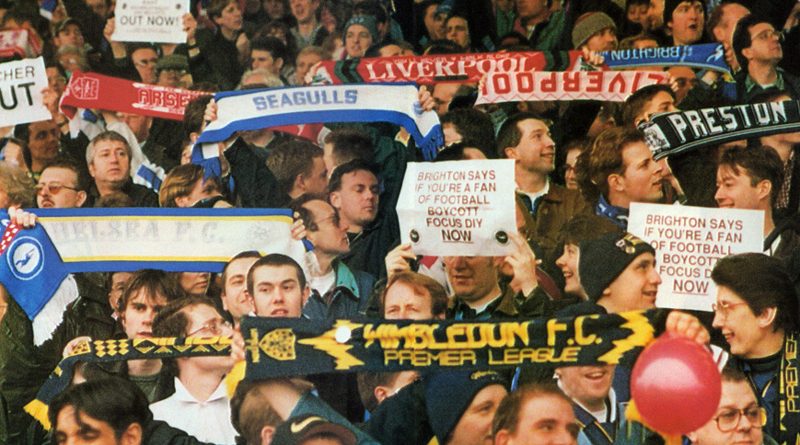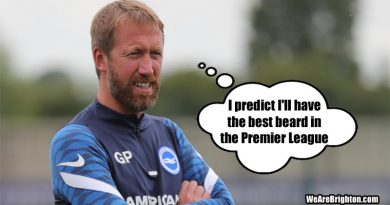27 years after Fans United, football still needs an Independent Regulator
It was 27 years ago last month since one of the most monumental matches in Brighton & Hove Albion history took place.
Saturday 8th February 1997. Brighton v Hartlepool United. Otherwise known as Fans United, when football supporters from across Europe flocked to the Goldstone Ground, saying we will not allow the murder of the Albion to take place.
Would that kind of movement have the same effect today as it did back then? Well, the closest modern example is happening right now over in Royal Berkshire.
A fellow blue and white striped club, Reading, have a fanbase fighting to oust an owner many see at risk of not just taking the club backwards, but putting its very existence at threat.
During the early 2000’s, Reading in some ways (but admittedly not all) were then to Brighton what Chelsea are now.
A club who could offer the potential of more money and more success under the leadership of an owner who rubbed some Albion fans up the wrong way and took a fair number of the club’s big names.
The most notable departure from Withdean to the Madjeski Stadium was manager Steve Coppell. Reading also swooped to steal loan players who had impressed for Brighton just as the Albion were hoping to make them permanent Seagulls, like Steve Sidwell and Ivar Ingimarsson.
Reading may have even tried to sign one of the two Kerry Mayos, however I can neither deny nor confirm which one.
But the thing about football is, it changes quickly. One minute you are King of the Hill, the next you are a non-entity diving towards irrelevance.
The histories of both Brighton and Reading demonstrate that all too well. And this can especially be true if your club ends up in the hands of the wrong people.
Reading fans have been showing their distrust and discontent of their owners recently, most notably in the form of a pitch invasion which saw their game at home to Port Vale suspended.
An event that for many Brighton fans, will have reminded them of that infamous game at home to York City where Albion fans managed the same in a similar fit of protest against its owners.
Brighton’s history does show that protests can work. But football’s landscape over the past few decades also shows that they only work in the long-term if you have the people in place to take over with an alternative and sustainable vision for running the club.
Getting rid of a bad owner or board of directors is one thing. The chance of them being replaced with a new leadership not just with a vision and financial capacity, but also the smarts to implement it, are a whole other entirely.
Brighton had that at their time of need. It was their guardian angel Liam Brady – the former Arsenal player and ex-Brighton manager – who pulled together a consortium that would ultimately save the club.
Brady had the nous to ask former marketing mogul and Albion fan Dick Knight to lead said consortium. It was ultimately a decision which saved the club.
Knight talks in his book Mad Man (a must read for any Albion fan) about “the phone call that changed my life” from Brady.
“At that moment my mind was racing. I sensed that I was Liam’s first, and probably only, resort. It was instantly exciting – and scary.”
“What would I be letting myself in for? How much money would I have to put in? I’d seen enough of how football clubs were run to want to do it better. But given the terrible state the club was in, could anyone actually save it, let alone remove Archer and company?”
I don’t think I need to explain how important Knight was to our club. Once in charge and installed as chairman, he united the fanbase and the entire city behind the Albion.
He even convinced the fans to stick behind existing director Ray Bloom, Tony Bloom’s uncle. Many at the time considered Bloom’s working relationship on the board alongside Archer, David Bellotti and Greg Stanley to be problematic.
There was a reminder of that when Stanley passed away in 2020 and the club released a tribute on its website to one of the men who did his upmost to kill the Albion off, including quotes from Ray Bloom.
For some, this closeness was enough to turn them against Ray Bloom in the late 1990s. Given what Tony has since gone onto do as Albion owner, supporting Ray and turning the tide of opinion back in his favour was possibly the best decision Knight ever made whilst Brighton chairman.
Reading on the other hand are in a very different situation. Whereas Knight was the only man willing/stupid enough to take over a homeless and broke Brighton, the Royals have the foundations of a Premier League club.
Their infrastructure, fan base and location close to London makes them an attractive option for foreign investment, as four different owners in the past five years shows.
These investors though are far less likely to want to put money in purely for the benefit of the club and the local community, as Knight and his fellow backers did for Brighton.
They will, somewhat understandably, usually want something back. Be that financial gain, personal acclaim, or something more sinister. They are often in it for themselves and are just after whatever club with potential they can get hold of.
That said, there are a number of great examples of owners who have their football club at their heart and have led them to successful times.
One of the best being Jack Walker at Blackburn Rovers, whose dream was to see his local team whom he had supported his entire life become English champions for the first time in nearly a century.
Walker was described by The Guardian in their obituary as having: “Led Blackburn during a period that saw them rise from sustained obscurity to win their first championship since 1914.”
Blackburn is a town with a long football history, but also with a population not dissimilar to that of Worthing. So for them to win the Premier League is an achievement that shouldn’t be underestimated.
Walker, like many football club owners from down the years, was a local business owner who’d done good. Someone who saw owning the club he loved as an opportunity to give back in his later years, not dissimilar to Knight.
Figures like Knight, Walker and Bloom are rare these days. As former Reading owner John Madjeski stated somewhat crassly back in 2011 when he originally put the club up for sale: “If some rich bastard wants to buy it they can. They have to be billionaire status.”
13 years on and English football has changed so much that if you are not a billionaire or have a hand in a sovereign wealth fund, then you may as well look to other leisure activities to spend your wealth.
And unfortunately, that limits the pool of potential owners and limits the chance of those owners having any altruistic intentions.
Reading have a financial situation that does indeed require some serious altruistic investment to turn it’s fortunes around.
Their latest filed accounts from the year ended 30 June 2022 show negative equity to the tune of £63 million, whilst annual expenditure totalled £42 million, generating annual loss of £17 million. That included £8 million of net profit from player sales, something I doubt the club will repeat any time soon.
In comparison, Brighton in 1997 had accumulated a negative equity of £960,000, with annual expenditure totalling £2.8 million, generating a loss of £1.4 million.
Even taking account of inflation and the lowly status of the Albion at that time, the difference there shows the huge burden now placed on owners as individuals to ensure clubs are able to just make ends meet, let alone be competitive.
It all comes back to the striking lack of sustainability in English football as clubs chase the hundreds of millions available for being one of the 20 that makes up the Premier League.
And when things do go wrong and said clubs end up as one of the 72 not enjoying the money of the top flight, the rich owners sometimes have the temerity to hold the fans to ransom.
Take a look at Sheffield Wednesday. After warranted criticism of his ownership of the club last summer, Dejphon Chansiri threw his toys out the pram and issued a rather remarkable statement in September vowing not to invest any more of his money in the club.
Chansiri complained he was “being treated unfairly” and said the fan “protests are a waste of time.” He subsequently told supporters via the local press back in October that fans needed to pay £2 million to cover the outstanding debt and player wages, or risk losing the club. Despite those claims, this debt was then paid by the club just two days later.
Where this chaos will end for Wednesday is hard to say, but it is unlikely be to in a positive scenario. What happenings at Hillsborough do highlight is that fans have greater means to organise themselves in terms of protests via social media in the 2020s.
At the same time, the extent of the dependency of modern professional football on super-rich owners has become unsustainable.
I have seen some suggest there are lessons Reading can take from Brighton’s struggles in the 90’s, which is certainly true.
But football has changed and there are also lessons that Brighton, and many other clubs chasing their dreams can take from the likes of Reading too.
Lessons of how fragile success and relative sustainability is in English football, and how things can quickly go in the wrong direction.
Nobody wants to think about who owns Brighton after Tony Bloom and hopefully that is some way off. But when Blackburn were winning the Premier League under the ownership of local hero Walker, their fans probably never expected to end up in League One owned by an Indian chicken company.
If there are lessons that can still be taken from Brighton’s time of struggles in the 1990s, it is that football isn’t good at learning lessons and that every club thinks it will never be them in crisis, until of course, it is.
The financial mess clubs are putting themselves in, the number who have almost gone out of business, the examples of Bury and Macclesfield Town and the amount of unscrupulous owners in English football all demonstrate the need for an independent football regulator 27 years on from Fans United.
Phil




